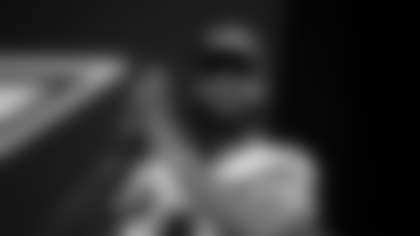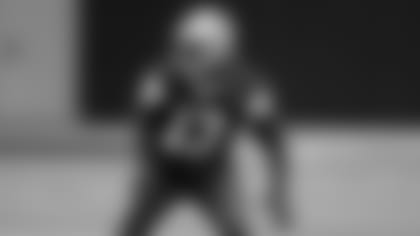Catching the deep snap at his own 13-yard line midway through the first quarter of the Cowboys' fourth preseason game this summer, Chris Jones stepped up, fired his powerful left leg toward the heavens just as he has done thousands upon thousands of times before, and launched a booming punt. A kick so powerful it actually struck the center-hung video board 90 feet above the field at AT&T Stadium and still had enough oomph to carry 45 yards downfield.
The game was a meaningless exhibition, and yet this was the most noteworthy thing Jones has done in his career, becoming only the second punter to strike the underside of the giant high-definition screen in a game. This certainly isn't to say Jones is a bad punter – his 44.0-yards-per-kick average (in an admittedly young career) would rank among the best 35 punters of all time – it's only to say that Jones has thus far managed to fly under the radar. And considering the attention paid to NFL players across the country, and especially in football-crazed Dallas, remaining a relative unknown is a pretty good trick in and of itself.
In a world where NFL players are cultural icons, hounded for autographs and photos or, worse, targeted by people seeking to take advantage of them, Jones is the rare athlete who can get around undetected by the fanbase in the city where he plays. In fact, apart from the team hotel or training camp, he says he's never been recognized.
"That's the huge upside of my position, being a punter," Jones says. "Punters are known, but it's not like I'm [Tony] Romo or [DeMarcus] Ware or [Jason] Witten, or any of those guys. That's nice. I can get out and do stuff and enjoy spending time with my family and friends, whatever. I can live life. The only place, really, that anybody recognizes me is when I go back to my hometown in Georgia. Other than that, I feel like I can fly under the radar when I'm in public. If someone strikes up a conversation with me and asks what I do, they're like, 'Oh, that's cool.'"
And there have been people who didn't even believe Jones when he copped to being an NFL player.
"I'd almost rather it be that way, than people to say, 'Oh, that's so-and-so, he plays for the Cowboys," Jones says. "I'd just rather things be genuine with people I meet or talk to."
Listed at 6-0, 208 pounds and wearing a buzz cut, the 24-year-old Jones looks more like an SMU frat boy than a professional athlete, and he has the demeanor of the average, unassuming Joe. It's a product of his upbringing in Rome, Ga., population 36,181, and his continued education at Carson-Newman College, a small, historically Baptist liberal arts school in Jefferson City, Tenn.
"At his very core, he's kind of a country boy," says Greg Cater, a Rome native and family friend who coached Jones in punting when he was in high school and college. "What you see is what you get with him. He was raised by good parents. I know his family well – in fact, I know his extended family well – and they're all of that same makeup. He's not flashy. He just kind of is who he is."
Cater, who played in the NFL himself during six seasons with Buffalo and St. Louis from 1980 to 1987, knows that usually, punters have the most-average lives of anyone on the team, save for maybe the long-snapper. Their names aren't recognizable to casual fans – the Cowboys' young punter isn't even the second-most famous "Jones" associated with the team; even the most hardcore football addicts don't often recognize the faces of punters, unlike placekickers, who are frequently televised in close-up shots just before a crucial field goal attempt.
A few punters in Cowboys history have achieved some local acclaim. Fans will perhaps remember the names John Jett, Toby Gowin or Micah Knorr from the last couple of decades, and Danny White will obviously ring a bell, but probably only because of his full-time gig as a quarterback.
The first punter who will come to mind for many Cowboys fans, and the most accomplished in team history, is Mat McBriar, who suffered a foot injury that gave way to Jones' NFL debut two years ago. During training camp that summer, Jones had so impressed special teams coordinator Joe DeCamillis with his consistent leg and athleticism – yes, athleticism – that he was the shoo-in choice to fill McBriar's spot when the veteran missed two games. The team even took the rare step of keeping Jones on the practice squad after McBriar returned, making sure to protect his rights.
The Cowboys let McBriar go the following season, and handed the job to Jones, but he was struck by the same sort of misfortune that befell his predecessor. During the third game of the 2012 campaign, Jones collided with Tampa Bay linebacker Dekoda Watson and suffered a partial tear of the anterior cruciate ligament in his kicking leg. He rehabbed and returned to play one more game in October, but ultimately Dallas was forced to place him on the season-ending injured reserve.
While he may not be troubled by the fame with which most NFL players must deal, Jones found he wasn't immune from the other downside, the intense physical demands. "That's part of football," he told The Dallas Morning News. "Stuff like that happens to guys week in and week out."
It might not have been the preferable path, but in taking a bump in stride and working his way back in time for 2013, Jones also proved to his teammates that he is a regular player.
"The special teams guys … they all kind of knew me. From camp, they knew, 'He's this country boy, he's the one wearing the boots and jeans,'" Jones says. "Everybody else, it took a little time for everybody to look at me as a player or see me as that."
Jones is perfectly at home in the locker room these days, another one of the guys, although he's the only one wearing hunting camouflage a lot of the time. Jones is still getting used to life in the big city. While hints of southern culture may permeate Dallas, the city is still a long way from the simpler life Jones grew accustomed to in Georgia and Tennessee.
"Since I've been out here, I haven't had much opportunity to find the good lease property to hunt, or the good fishing spots, or anything like that, really," Jones says. "I always joke with people back home. I tell them we're used to being able to go wherever we want – the movies, the mall, Walmart – everything's within 10 minutes of us. Now I've got to drive 30 minutes to go get groceries." [embedded_ad]
No matter how long he stays, Jones will never get used to North Texas traffic. And though he'll feel more and more at home as the years pass, he knows that small-town life will always hold a special place in his heart. In a lot of ways, the slow, simple pace back in Rome contributed to Jones' development as a punter.
"I remember when I was 5 or 6 years old, I had like a high school-size football, and I would get out in the front yard and kick it back and forth for hours and hours," Jones says. "As I got older and older, instead of just kicking the ball across the yard, I started being able to kick spirals, and it just progressed from there. In Pee Wee, I was the only one who could long snap, believe it or not, so I had to do that instead, and then when I got to the middle school team I started punting, and I've been doing it ever since."
By high school, Jones was attending kicking camps during his summer break and working with Cater and another former pro leg, Bill Turner, on the side.
"He was consistently kicking the ball 40 to 50 yards and getting exceptional hang time," Cater says. "I remember telling him, 'if you give the scouts this, I promise you you're going to catch their eye'.
"Chris is an exceptional athlete. He was a [running back] in high school. … And plus he works hard. When you combine those two elements, that's a pretty good cocktail for a kid to excel at what he does."
As a regular kind of guy who happens to be living the NFL dream – though you would never know it – Jones vows to just keep working hard. "It's been a huge, overwhelming blessing to make it this far and be where I am," Jones says. "You try to stay as humble as possible and take the whole experience for what it is, and just enjoy it. … I always tell people it doesn't matter if I'm making $25,000 or a million, I'm going to just try my best to be the same person, regardless of everything that's going on around me."















